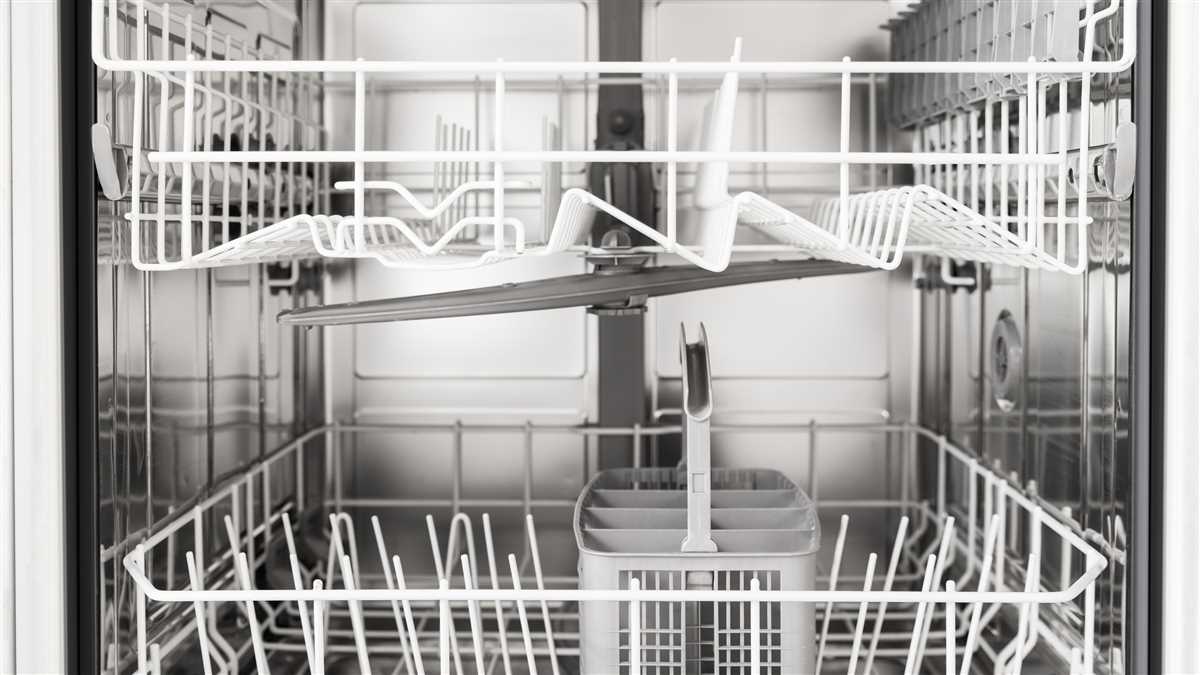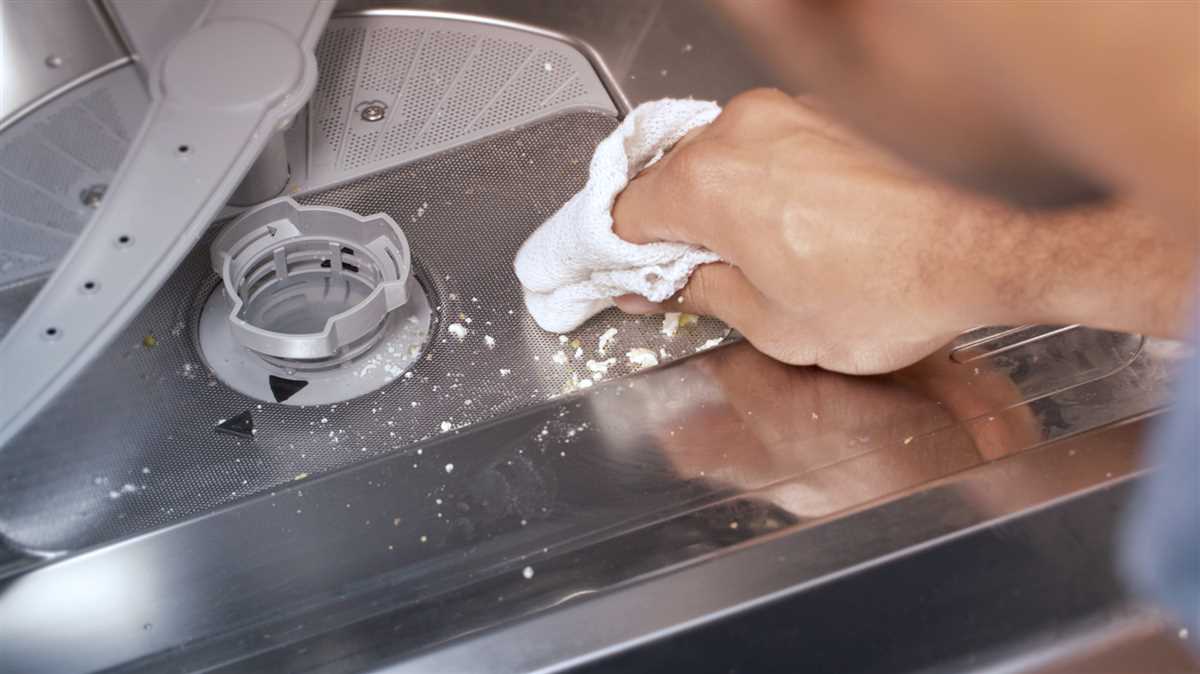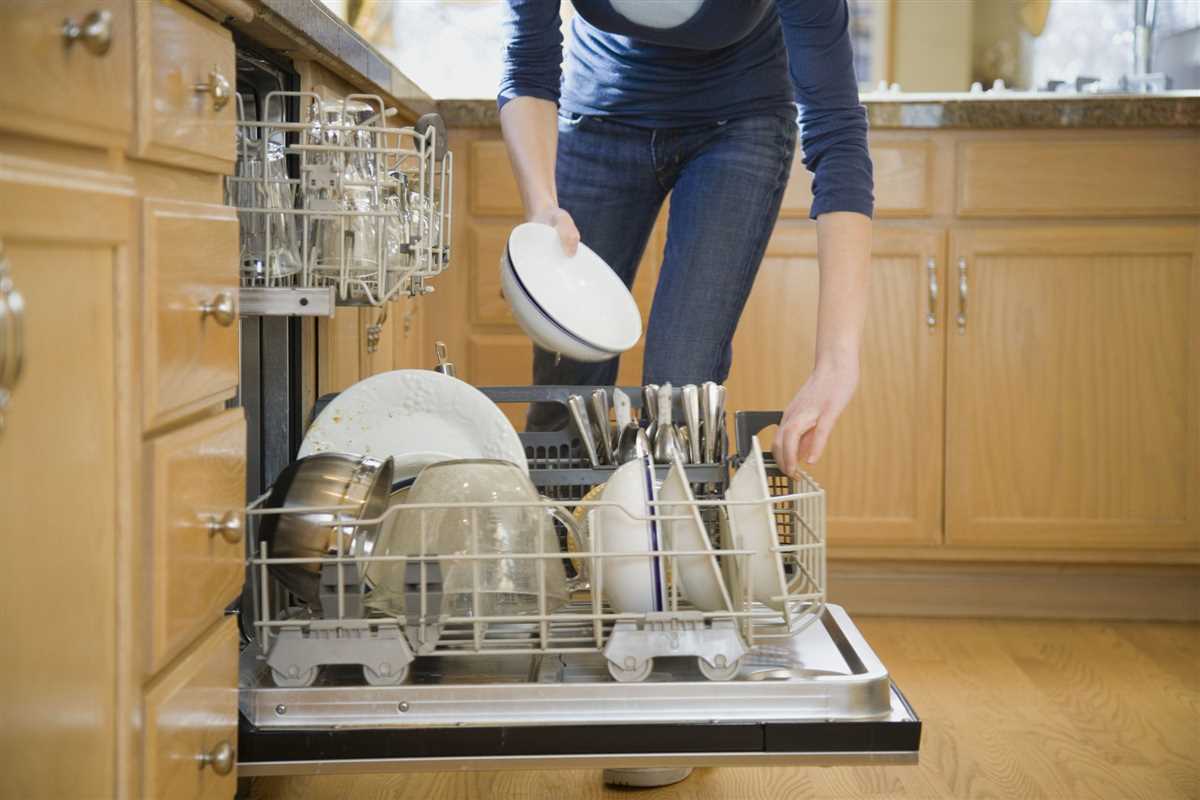




Cleaning your dishwasher is an essential part of maintaining its performance and prolonging its lifespan. Over time, food particles, residue, and mineral buildup can accumulate in your dishwasher, causing unpleasant odors, reducing its efficiency, and even leading to clogs. Regular cleaning not only ensures your dishes come out sparkling clean but also helps prevent costly repairs down the line.
In this step-by-step guide, we will walk you through the process of cleaning your dishwasher to help keep it running smoothly. Whether you have a top-loading or front-loading dishwasher, the basic cleaning steps are similar. By following these easy steps, you’ll be able to eliminate odors, remove stains, and keep your dishwasher operating at its best.
Before we delve into the cleaning process, it’s important to note that safety should always be your top priority. Make sure to disconnect your dishwasher from the power source and wear protective gloves to avoid any accidents or injuries. Additionally, consult your dishwasher’s manufacturer manual for specific cleaning instructions, as some brands may have unique guidelines or restrictions.
Now, let’s get started with our comprehensive guide on how to clean a dishwasher and ensure it remains in top-notch condition for years to come.
Why Clean Your Dishwasher Regularly
The dishwasher is a vital appliance in your kitchen, responsible for cleaning and sanitizing your dishes and utensils. However, over time, it can accumulate food particles, grease, and soap scum, which can lead to unpleasant odors, poor cleaning performance, and even damage to your dishwasher.
1. Prevents Unpleasant Odors
Regularly cleaning your dishwasher helps remove any trapped food particles that may have been left behind after a wash cycle. These particles can start to decompose over time, leading to unpleasant odors that can transfer to your dishes.
2. Improves Cleaning Performance
As food particles and soap scum build up inside your dishwasher, they can clog the spray arms and filters, reducing water flow and hindering the cleaning process. Cleaning your dishwasher regularly helps maintain optimal performance and ensures your dishes come out sparkling clean every time.
3. Extends the Lifespan of Your Dishwasher
By keeping your dishwasher clean and free from debris, you can help prolong its lifespan. Excessive buildup of food particles and grease can cause clogs, damage the internal components, and lead to costly repairs or the need for a replacement.
4. Prevents Bacterial Growth

A dirty dishwasher can become a breeding ground for bacteria, especially in warm and moist environments. Regular cleaning helps eliminate bacteria and ensures that your dishes are properly sanitized during each wash cycle.
5. Enhances Energy Efficiency
A dirty dishwasher has to work harder to clean your dishes, leading to increased energy consumption. By keeping your dishwasher clean, you can improve its efficiency and reduce your energy bills.
In conclusion, cleaning your dishwasher regularly is essential to maintain its performance, prevent odors, and prolong its lifespan. By incorporating dishwasher cleaning into your regular kitchen cleaning routine, you can ensure that your dishes come out sparkling clean and free from bacteria every time.
Importance of Keeping Your Dishwasher Clean
It is important to keep your dishwasher clean in order to ensure its optimal performance and longevity. Regular maintenance and cleaning not only help remove built-up residue and odor, but also prevent the growth of bacteria and mold that can contaminate your dishes.
Efficient Cleaning
A clean dishwasher is essential for efficient cleaning. Over time, food particles, grease, and mineral deposits can accumulate on the interior surfaces and clog the spray arms, filters, and other components. This buildup can interfere with water circulation and reduce the effectiveness of your dishwasher, resulting in dishes that are not properly cleaned.
Elimination of Odors

Regular cleaning of your dishwasher helps eliminate unpleasant odors. Food remnants, grease, and soap scum can leave a lingering smell that can transfer onto your dishes. By cleaning the interior, filters, and seals, you can remove these odors and ensure that your dishwasher leaves your dishes smelling fresh.
Bacteria and Mold Prevention
A dirty dishwasher can become a breeding ground for bacteria and mold. The warm and moist environment provides the perfect conditions for these microorganisms to grow. By regularly cleaning and sanitizing your dishwasher, you can prevent the growth of harmful bacteria and reduce the risk of cross-contamination.
Extended Lifespan

Maintaining a clean dishwasher can help extend its lifespan. By removing debris and mineral deposits, you can prevent clogs and damage to the various components of your dishwasher. Regular cleaning also helps reduce the wear and tear on the machine and ensures that it operates efficiently, saving you money on repairs or replacements in the long run.
Improved Energy Efficiency
A clean dishwasher operates more efficiently, which can result in energy savings. When the interior and components are free from buildup, water circulation and heating are not impeded, allowing the dishwasher to use less energy for each cycle. By keeping your dishwasher clean, you can reduce your carbon footprint and save on energy costs.
Overall Hygiene
Keeping your dishwasher clean contributes to overall kitchen hygiene. As the dishwasher is used to clean your dishes, it is important to ensure that it remains clean itself. A dirty dishwasher can transfer bacteria and odors to the dishes, compromising their cleanliness and potentially increasing the risk of foodborne illness.
Regular maintenance and cleaning of your dishwasher is essential to ensure its efficient performance, eliminate odors, prevent bacteria and mold growth, extend its lifespan, improve energy efficiency, and maintain overall kitchen hygiene. By following a cleaning routine and utilizing the appropriate cleaning products, you can keep your dishwasher running smoothly and ensure clean and sanitized dishes every time.
Benefits of Regular Dishwasher Cleaning
Regular cleaning of your dishwasher can provide numerous benefits for both the appliance itself and your dishes. Here are some key advantages of maintaining a clean dishwasher:
1. Improved Cleaning Performance
A clean dishwasher is more effective at cleaning your dishes and removing stubborn food particles. Over time, mineral deposits, grease, and food debris can accumulate inside the dishwasher, leading to clogged spray arms and filters. By regularly cleaning your dishwasher, you can ensure optimal performance and cleaner dishes.
2. Extended Lifespan
Regular maintenance and cleaning can help extend the lifespan of your dishwasher. By preventing the buildup of mineral deposits and scale, you can avoid costly repairs and premature appliance failure. Cleaning the dishwasher also helps to prevent the growth of mold and bacteria, which can damage internal components over time.
3. Improved Energy Efficiency
A clean dishwasher operates more efficiently, which can help you save energy and reduce your utility bills. When mineral deposits and food particles accumulate, it can restrict water flow and decrease the dishwasher’s ability to heat the water properly. This leads to longer cleaning cycles and higher energy consumption. By cleaning the dishwasher regularly, you can maintain its energy efficiency and reduce your environmental impact.
4. Enhanced Hygiene
Regular cleaning of your dishwasher helps to eliminate odors and bacteria, resulting in cleaner and more hygienic dishes. The warm and damp environment inside the dishwasher can promote the growth of bacteria and mold, which can contaminate your dishes and create unpleasant smells. Cleaning the appliance regularly helps to eliminate these issues and ensures that your dishes are safe to use.
5. Prevention of Damage
By regularly cleaning your dishwasher, you can identify and address any potential issues before they become major problems. This proactive approach can help prevent leaks, clogs, and other damage that may result from neglecting the maintenance of your dishwasher. Regular cleaning also allows you to inspect and clean the dishwasher’s interior, helping to remove any hard water stains or residue that can cause damage over time.
By understanding the benefits of regular dishwasher cleaning and implementing a cleaning routine, you can ensure the longevity of your appliance, maintain its efficiency, and enjoy cleaner, more hygienic dishes.
Step 1: Preparation
Before you begin the cleaning process, it is important to gather all the necessary supplies. This will ensure that you have everything you need and can complete the task efficiently.
Supplies Needed:
- Dishwashing detergent
- Vinegar
- Baking soda
- Soft cloth or sponge
- Toothbrush
- Paper towels
Important Note:
Make sure to unplug the dishwasher from the power source before starting the cleaning process. This will prevent any accidents or injuries.
Gather Necessary Cleaning Supplies
Before you start cleaning your dishwasher, it’s important to gather all the necessary cleaning supplies. Having everything ready will help make the process more efficient and ensure that you have everything you need.
Here’s a list of the cleaning supplies you will need:
- Dish soap or dishwasher cleaner
- Vinegar or citric acid
- Baking soda
- Soft cloth or sponge
- Old toothbrush
- Toothpicks or wooden skewers
- Clean, dry towels or paper towels
Optional supplies that may come in handy:
- Rubber gloves
- Protective eyewear
- Mildew remover (if there is buildup)
- Lemon juice (if you prefer a citrus scent)
Note:
Make sure to read the manufacturer’s instructions for any specific cleaning recommendations or restrictions. Some dishwasher models may require specific cleaners or may have parts that should not be cleaned with certain products.
Remove and Clean Dishwasher Racks
Step 1: Empty the dishwasher
Before removing the dishwasher racks, make sure the dishwasher is completely empty. Remove any dishes, utensils, or debris that may be inside.
Step 2: Lower the top rack
Start by lowering the top dishwasher rack. Pull it out as far as it will go and tilt it slightly downwards. This will allow you to access the rack removal mechanism.
Step 3: Remove the rack from its tracks
Locate the plastic tabs or clips on each side of the rack where it connects to the metal tracks. Press or lift the tabs to release the rack from the tracks. Slowly slide the rack out of the dishwasher.
Step 4: Remove the lower rack
Once the top rack is removed, you can access the lower rack. Follow the same procedure as in step 3 to remove the lower rack from its tracks.
Step 5: Clean the racks
Take the dishwasher racks to the sink and use a mild detergent or dishwasher cleaner. Scrub the racks with a soft brush or sponge to remove any food particles, stains, or mineral deposits. Rinse the racks thoroughly with water and dry them completely before reinstalling them in the dishwasher.
Step 6: Reinstall the racks
Once the racks are clean and dry, slide them back into the dishwasher on their respective tracks. Make sure they are properly aligned and secure them in place by pushing down or sliding the tabs or clips back into position.
Step 7: Test the racks
After reinstalling the racks, test their movement by sliding them in and out of the dishwasher. Make sure they glide smoothly and that there are no obstructions or misalignments.
Step 8: Clean the dishwasher interior
While the racks are removed, take the opportunity to clean the dishwasher interior. Wipe down the walls, door, and the bottom of the dishwasher with a damp cloth or sponge. Remove any debris or residue that may have accumulated.
Step 9: Run a cleaning cycle
To ensure your dishwasher is thoroughly cleaned, run a cleaning cycle using a dishwasher cleaner according to the manufacturer’s instructions. This will help remove any remaining buildup or odors that may be present.
Following these steps will help you remove and clean your dishwasher racks effectively and keep your dishwasher running smoothly.
Step 2: Cleaning the Interior
Once you’ve removed any debris and cleaned the exterior of your dishwasher, it’s time to focus on the interior. Cleaning the inside of your dishwasher is essential to remove any dirt, grime, and buildup that may affect its performance.
Follow these steps to effectively clean the interior of your dishwasher:
- Remove the Dish Racks: Start by removing the dish racks from your dishwasher. These racks can be cleaned separately to ensure a thorough cleaning.
- Inspect the Drain: Check the dishwasher drain for any clogs or debris. Remove any visible debris using a paper towel or a soft brush.
- Clean the Filter: Locate the dishwasher’s filter, usually at the bottom of the interior. Carefully remove the filter and rinse it under running water to remove any food particles or residue.
- Clean the Spray Arms: The spray arms of your dishwasher may become clogged with food particles. Remove the spray arms and rinse them under warm water. Use a toothpick or a small brush to unclog any debris from the spray holes.
- Check the Drainage Hose: Inspect the drainage hose for any blockages or kinks. If you notice any issues, carefully remove the hose and clean it with warm water and a mild detergent if necessary.
- Use Vinegar and Baking Soda: To remove any remaining buildup or odors, place a cup of white vinegar in a dishwasher-safe container on the top rack. Run a cycle with the dishwasher empty, using the hottest water setting. After the vinegar cycle, sprinkle a cup of baking soda on the bottom of the dishwasher and run another cycle.
- Wipe Down the Interior: Once the cleaning cycles are complete, use a damp cloth or sponge to wipe down the interior of the dishwasher, including the door, walls, and gasket. Pay special attention to any stubborn stains or residue.
Following these steps will help ensure that your dishwasher’s interior is clean and free from any buildup or odors. Regular cleaning and maintenance will help extend the lifespan of your dishwasher and ensure optimal performance.
FAQ
Why should I clean my dishwasher?
Cleaning your dishwasher is important to remove any built-up residue, grease, and odors. It will also help your dishwasher to run more efficiently and avoid potential problems.
How often should I clean my dishwasher?
It is recommended to clean your dishwasher once a month to ensure optimal performance. However, if you notice any signs of buildup or odor, you may need to clean it more frequently.
What supplies do I need to clean a dishwasher?
To clean a dishwasher, you will need white vinegar, baking soda, a soft brush or sponge, and a cloth. You may also want to have a toothpick or small wire brush to clean the spray arms and other hard-to-reach areas.
Can I use bleach to clean my dishwasher?
No, it is not recommended to use bleach to clean your dishwasher. Bleach can damage the rubber seals and other components of the dishwasher. It is best to use white vinegar and baking soda as natural cleaning agents.
What is the best way to remove limescale from the dishwasher?
To remove limescale from your dishwasher, you can fill a cup with white vinegar and place it on the top rack. Then, run a hot water cycle without any dishes. The vinegar will help dissolve the limescale and clean the interior of the dishwasher.
How do I clean the filter in my dishwasher?
To clean the filter in your dishwasher, you can remove it from the bottom of the dishwasher and rinse it under running water. Use a brush or toothpick to remove any debris or buildup from the filter. Once it is clean, you can reinsert it back into the dishwasher.













